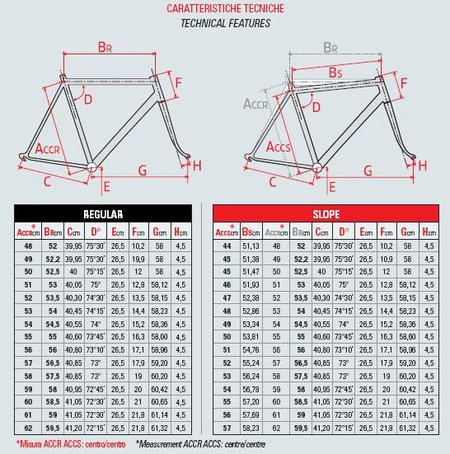Difference between revisions of "De Rosa Corum"
Jump to navigation
Jump to search
m |
m |
||
| Line 1: | Line 1: | ||
{{X}} | {{X}} | ||
| − | [[image:derosa corum.jpg|thumb|400px| | + | [[image:derosa corum.jpg|thumb|400px|right|'''De Rosa Corum''']] |
| − | == | + | ==Steel Frame == |
Thanks to its construction technique using TIG welds, this is a modern interpretation of our most classic tradition in the steel racing frames sector. Corum is made both "to measure" in artisan style and in a range of as many as 30 sizes: from 48 to 62 in the "regular" geometry, and from 44 to 57 in the latest slope version. Every frame has a steering tube with "integrated" caps, which we combine with a specific full carbon fork. | Thanks to its construction technique using TIG welds, this is a modern interpretation of our most classic tradition in the steel racing frames sector. Corum is made both "to measure" in artisan style and in a range of as many as 30 sizes: from 48 to 62 in the "regular" geometry, and from 44 to 57 in the latest slope version. Every frame has a steering tube with "integrated" caps, which we combine with a specific full carbon fork. | ||
| Line 10: | Line 10: | ||
| − | [[Image:43762-misure corum.jpg| | + | [[Image:43762-misure corum.jpg|left|450px|thumb]] |
Latest revision as of 09:41, 12 February 2009
File:Derosa corum.jpg
De Rosa Corum
Steel Frame
Thanks to its construction technique using TIG welds, this is a modern interpretation of our most classic tradition in the steel racing frames sector. Corum is made both "to measure" in artisan style and in a range of as many as 30 sizes: from 48 to 62 in the "regular" geometry, and from 44 to 57 in the latest slope version. Every frame has a steering tube with "integrated" caps, which we combine with a specific full carbon fork. Weight (no fork/no head set): 1.600 gr.
